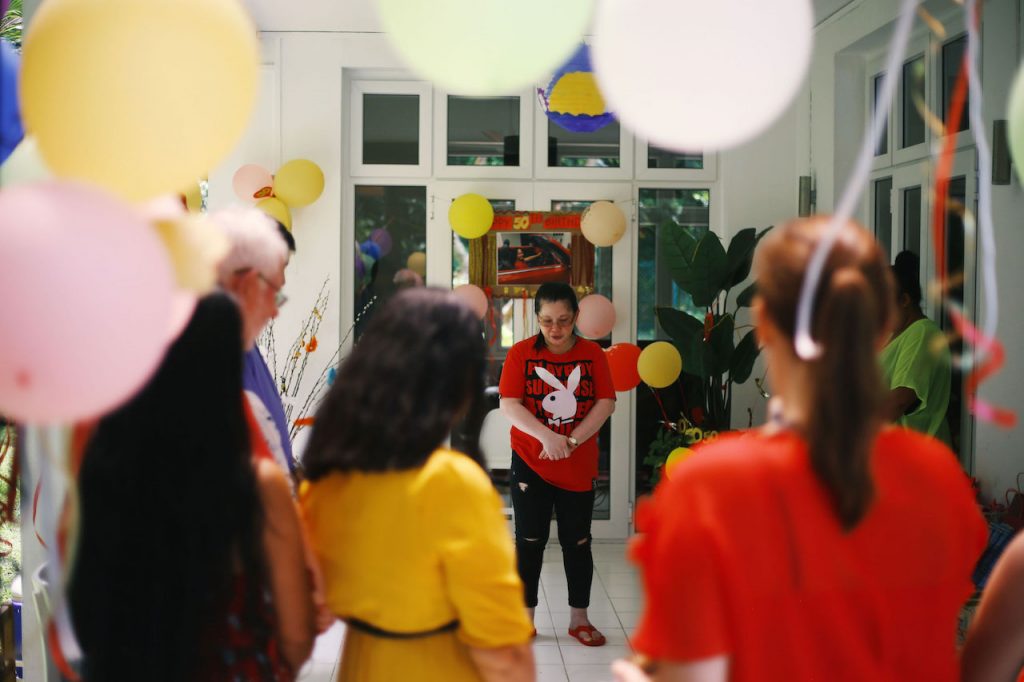“If you give them more, they will spend more.”
After reading our story on the burgeoning debt problem amongst foreign domestic workers in Singapore, Emelda wrote to us about her experiences as someone who has been working here for a little under three decades.
On the issue of debt, Singaporeans often hear the opinions of journalists (like ourselves), rights groups, government agencies, and local employers. We rarely hear the opinion of the employees themselves—employees like Emelda.
Emelda comes from the Philippine island of Mindanao, where her family have historically been farmers. While she did not have the money to enrol in college, Emelda attended night classes for a two-year junior nursing course.
During the day, she worked as a domestic helper, but her salary in the Philippines was not great. Her uncle, who worked at the department of labour in the Philippines, helped her find a job in Singapore. This was in 1992; she was 23 years old. Like all foreign workers, Emelda was motivated by a desire to provide a better life for her family.
After working six months without a day off, she finally caught a break—but rather than taking a chill pill, she enrolled in a Nursing Aid course at Lions Nursing Home, partly out of a desire to further her education in the field she had been studying back in the Philippines.
Over the subsequent years, Emelda completed a variety of courses: nursing, computer skills, international cuisine, bakery, and most recently, business. It seems that she hasn’t spent a Sunday outside of some classroom or the other.

Her education has already reaped rewards. After going for the computer skills course, she has been able to apply for jobs online, through email and Skype interviews, bypassing local employment agencies and their associated fees.
Meanwhile, the practical classes have improved her skills as a domestic helper.
“If my employer has a party,” she explains, ”Like a birthday party for the kids, they don’t have to order from a cake shop. They can save some money.”
The same logic applies to her international cuisine course.
“Some employers want Italian, some want to experience Indonesian cuisine. They like to eat different types of cooking… This benefits me, because when I apply for another job, they look for your credentials. [From] a $600 salary, they will give you, like, $800, because you are someone experienced.”
She would advise all foreign workers to spend their time going for such courses, and it’s not just for financial reasons. Learning new things is fulfilling in it’s own right. And, as Emelda says, you can lose everything in life, “but an education—nobody can take that away from you.”
Speaking of salary, I ask the thorny question that’s been weighing on my mind. While rights groups may advocate for higher wages, cynical Singaporean employers don’t think it will better the debt situation of foreign workers. In the past, I have myself often tried to shy away from the ‘poor people don’t know how to spend their money’ rhetoric. But who’s right?
“It’s just amazing,” Emelda sighs in response. “How domestic workers here are wasting their time… There’s a lot to explore when you go back, but you have nothing, no knowledge [that you can use] in the Philippines.”
“But, you know” she laughs, “We’re not controlling them. Some of my friends, I encourage them to enrol, because we are getting old…”

“A lot of [Filipinos] here never pay for the pension. When they go back, they have nothing,” says Emelda.
She has a simple solution to this: “Now, every day, you have to write down all the expenses. In one month, this is what you spend.”
Emelda has her relatives send her this list every month so she can ensure that they are not spending her money frivolously.
At home, she painstakingly lays out her budgeting ‘rules’. Pork costs 20 times more than fish? Eliminate meat altogether, eat vegetables instead. As for rice, $30 a sack should last for two months; her monthly gas bills amounts to some $25. The list goes on.
This is how Emelda manages her household expenses in excruciating detail, all the way from Singapore.
But then her tone falters. She breathes deeply, as though steadying herself.
“It’s just… Sometimes, you trust people so much.”
This is the hidden cost of Emelda’s financial stability. Families in the Philippines may have come to expect a free-flow of cash from their relatives who work in Singapore, and Emelda doesn’t give in so easily. This resistance doesn’t come cheap.
“I have a difficulty with my son, now that he’s growing up. I don’t know how to-” she stops for a beat.
“-because I wasn’t there… I think his mind is like: giving money is what love is. I try to explain it to him, but it’s hard. I hope he can realise what life is, how difficult life is.”

Nervously, I chuckle along, then she catches my eye.
“You think it’s so funny, but it’s really painful.”
Some years ago, Emelda’s father was taken to the hospital, where they discovered that his kidneys were failing.
“What can you do?” she asks, “You can’t do anything anymore. How much percentage can you guarantee, the doctor can guarantee, to survive?”
“If my father is old, and they want to operate, I’m not going to send to the doctor anymore. Because they will ask you for so much. So much money.”
“I know it’s very painful that your parents will go… I always stand for them, but in a positive way. Why suffer? I want you to rest.”
“Maybe some of them should,” Emelda says, referring to other domestic workers who go into debt to finance such costly medical procedures. “But [maybe] they don’t understand the situation. They have to widen their minds, ask the doctor… and think. Because you’re working here, have no savings, just borrow, how are you going to return? You have to think [of] yourself.”

She wrote to us out of a desire to change the minds and lives of her fellow migrant workers. Before her birthday party, I ask what gifts she’s expecting.
“I asked them not to give me gifts. Give me cash,” she replied, “In [the] public school, the government cannot afford to build some things. I am giving five bags of cement and one load of sand [for this],” she replies.

Emelda’s story, her perspective, is unique. It may be applicable to other domestic workers, or to all of us, in full or in part, or not at all.
But it is a snapshot of the sacrifices, big or small, that our domestic workers struggle through just to be here. It is a reminder that, when we speak on issues like these, we are speaking not of numbers—of percentages, interest rates, data—but of people, individual and unique, with their own weaknesses, challenges, and dreams.






